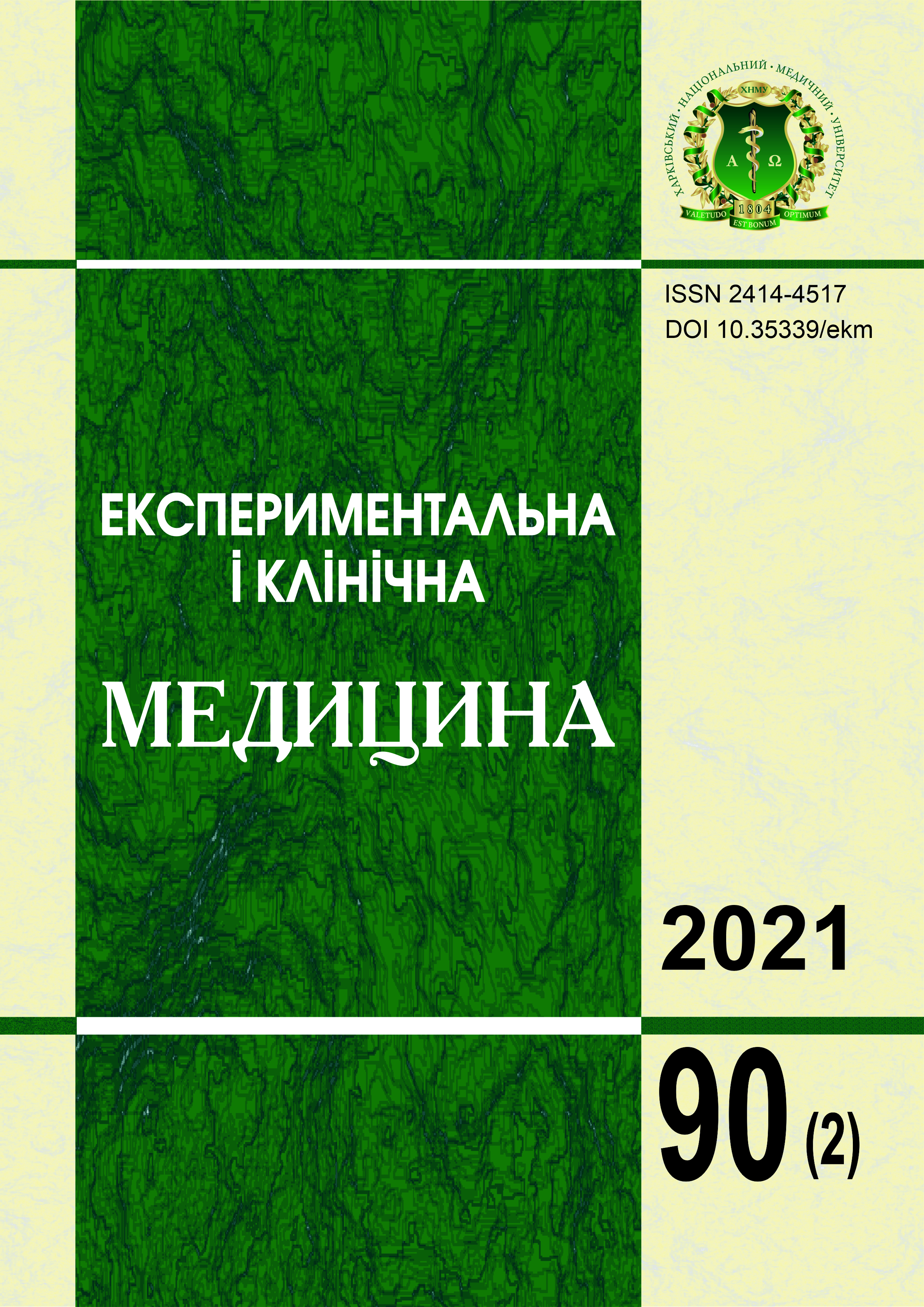Abstract
The study of mental disorders resulting from COVID-19 has high social and medical significance. At present, there is a need for comprehensive research aimed at studying the psychopathogenesis of mental disorders that develop on the background of COVID-19. It is also necessary to develop personalized programs of pathogenetically based therapy and rehabilitation for patients who have recovered from COVID-19. It was examined 125 patients with COVІD-19 with non-psychotic mental disorders, both sexes (68 women and 57 men) with a mean age of (36.0±3.4) years. In the clinical picture of non-psychotic mental disorders in the examined patients are depressive (29.1%), anxious (33.4% of patients), astheno-neurotic (24.2%) and cognitive (13.3%) syndromes, as shown by results of clinical and psychopathological study. Taking into account data obtained during the comprehensive examination of psychological, pathopsychological and clinical-psychopathological features of patients with COVID-19, it was developed a model of personalized psychotherapeutic support for patients who have recovered from COVID-19, which includes psychotherapy and psychoeducation. The psychotherapeutic program consisted of three consecutive stages: stage I – formation of compliance, stage II – corrective, stage III – consolidation and maintenance of results. An important component of the psychotherapeutic support program is psychoeducation, which aims to form an adequate system of ideas about the impact and consequences of COVID-19, and to involve patients in active participation in treatment. According to study results on the background of personalized psychotherapeutic support program of patients who have recovered from COVID-19, there was a stable therapeutic effect in examined patients, positive dynamics of psychopathological symptoms, increased psychophysical activity, improved cognitive performance and significant reduction of anxiety and depression.
Keywords: nonpsychotic mental disorders, coronavirus disease 2019, psychotherapy, psychoeducation.
References
van Voren R. Po kom zvonyt kolokol: kto zaplatyt samuiu vysokuiu tsenu za borbu s pandemyei COVID-19 [For whom the bell tolls: who will pay the highest price for fighting the COVID-19 pandemic]. Rakurs [Aspect], 01 Apr 2020 [Internet]. Available at: https://is.gd/gf1rnW [in russian].
Chaban OS, Khaustova OO. Psykhichne zdorovia v period pandemii COVID-19 (osoblyvosti psykholohichnoi kryzy, tryvohy, strakhu ta tryvozhnykh rozladiv) [Mental health during the COVID-19 pandemic (features of psychological crisis, anxiety, fear and anxiety disorders)]. NeuroNews. 2020;3(114):26-36. Available at: https://is.gd/Ie8AZz [in Ukrainian].
Gao J, Zheng P, Jia Y, Chen H, Mao Y, Chen S, et al. Mental health problems and social media exposure during COVID-19 outbreak. PLoS One. 2020;15(4):e0231924. DOI: 10.1371/journal.pone.0231924. PMID: 32298385.
Huang Y, Zhao N. Generalized anxiety disorder, depressive symptoms and sleep quality during COVID-19 outbreak in China: a web-based cross-sectional survey. Psychiatry Res. 2020;288:112954. DOI: 10.1016/j.psychres.2020.112954. Erratum in: Psychiatry Res. 2021;299:113803. PMID: 32325383.
Kozhyna GM, Zelenskaya KO. Up-to-date approaches to the treatment of depressive disorders. Ukrains'kyi Visnyk Psykhonevrolohii [Ukrainian Herald of Psychoneurology]. 2013;21(4(77)):90-3. Available at: http://nbuv.gov.ua/UJRN/Uvp_2013_21_4_20 [in russian].
Kireyeva YeN. System for preventing recurrent episodes of depressive disorders. International Neurological Journal. 2014;4(66):103-6. Available at: http://nbuv.gov.ua/UJRN/Mnzh_2014_4_13 [in russian].
Zarocostas J. How to fight an infodemic. Lancet. 2020;395(10225):676. DOI: 10.1016/S0140-6736(20)30461-X. PMID: 32113495.
Yuryeva L, Shusterman T. The COVID-19 pandemic: risks to psychological well-being and mental health. Ukrains'kyi Visnyk Psykhonevrolohii [Ukrainian Herald of Psychoneurology]. 2020;28(2(103)):5-10. Available at: http://nbuv.gov.ua/UJRN/Uvp_2020_28_2_3 [in russian].
Tkachenko O. Impact of the COVID-19 pandemic on mental health (literature review. Ukrains'kyi Visnyk Psykhonevrolohii [Ukrainian Herald of Psychoneurology]. 2021;29(1(106)):55-9. Available at: http://nbuv.gov.ua/UJRN/Uvp_2021_29_1_12 [in Ukrainian].
Duan L, Zhu G. Psychological interventions for people affected by the COVID-19 epidemic. Lancet Psychiatry. 2020;7(4):300-2. DOI: 10.1016/S2215-0366(20)30073-0. PMID: 32085840.
Hamilton M. The assessment of anxiety states by rating. Br J Med Psychol, 1959;32:50-5. Available at: https://dcf.psychiatry.ufl.edu/files/2011/05/HAMILTON-ANXIETY.pdf
Hamilton M. A rating scale for depression. J Neurol Neurosurg Psychiatry, 1960;23:56-62. Available at: https://dcf.psychiatry.ufl.edu/files/2011/05/HAMILTON-DEPRESSION.pdf
Spielberger CD. Manual for the State-Trait Anxiety Inventory (STAI). PaloAlto, CA: Consulting Psychologists Press. 1983. Available at: https://www.advancedassessments.co.uk/resources/Mental-Health-Test.pdf
Zigmond AS Snaith RP. The Hospital Anxiety and Depression Scale. Acta Psychiatr Scand. 1983;67:361-70. PMID: 6880820 DOI: 10.1111/j.1600-0447.1983.tb09716.x.

